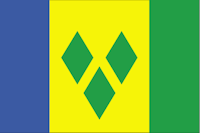Saint Vincent - Government
 St. Vincent and the Grenadines is a parliamentary democracy within the Commonwealth of Nations. Queen Elizabeth II is head of state and is represented on the island by a governor general, an office with mostly ceremonial functions. Control of the government rests with the prime minister and the cabinet.
St. Vincent and the Grenadines is a parliamentary democracy within the Commonwealth of Nations. Queen Elizabeth II is head of state and is represented on the island by a governor general, an office with mostly ceremonial functions. Control of the government rests with the prime minister and the cabinet.
The promulgation of the postindependence Constitution gave St. Vincent and the Grenadines a constitutional monarchy with an independent British-style parliamentary system of government. The Constitution in force in the late 1980s provides for the Parliament, which was composed of a thirteen-member elected House of Assembly, a six-member appointed Senate, and an elected attorney general. In 1986 a constitutional amendment was approved by the House to increase the number of seats in the House of Assembly to fifteen.
The country's head of state is the British monarch, who is represented in St. Vincent and the Grenadines by a governor general appointed for a five-year term. The governor general's duties include the appointment as prime minister of the member of the House who commands the support of the majority of the representatives. The governor general also appoints the senators, four on the advice of the prime minister and two on the advice of the leader of the opposition. In practice, the authority of the governor general is quite limited; he or she generally acts only with the approval of the government.
The parliament is a unicameral body, consisting of 15 elected members and six appointed senators. The governor general appoints senators, four on the advice of the prime minister and two on the advice of the leader of the opposition. The parliamentary term of office is 5 years, although the prime minister may call elections at any time.
The nation's judicial system is built on the foundations of English common law. There are eleven courts in the country within three magisterial districts. Although the Constitution is the supreme law of the islands, it allows for continued association with the Eastern Caribbean States Supreme Court, which is known in St. Vincent and the Grenadines as the St. Vincent and Eastern Caribbean States Supreme Court. It consists of the Court of Appeal and the High Court. The court of last resort is the Judicial Committee of the Privy Council in London.
As in other English-speaking Caribbean countries, the judiciary in St. Vincent is rooted in British common law. There are 11 courts in three magisterial districts. The Eastern Caribbean Supreme Court, comprising a High Court and a Court of Appeals, is known in St. Vincent as the St. Vincent and the Grenadines Supreme Court. The court of last resort is the judicial committee of Her Majesty's Privy Council in London.
The law provides for fair public trials, and an independent judiciary generally enforced this right. The court appoints attorneys only for indigent defendants charged with a capital offense. Defendants are presumed innocent until proven guilty, may be present at the trial, are informed promptly and in detail of the charges, may confront and question witnesses, and have access to relevant government-held evidence once a case reaches the trial stage. Defendants had access to interpretation as necessary from the moment they were charged through all appeals. Defendants may also present their own witnesses and evidence.
There is no local government in St. Vincent, and all six parishes are administered by the central government.
The Vincentian Constitution does not recognize dual citizenship. Every person born in St. Vincent and the Grenadines who was a British citizen prior to independence automatically became a Vincentian citizen on October 27, 1979. All persons born anywhere in the world to a Vincentian parent after that date were also granted citizenship.
Universal adult suffrage was first granted in 1951 for citizens twenty-one years of age. The new Constitution enfranchises citizens of eighteen years of age, and the minimum age for eligibility to hold office by election or appointment is twenty-one years. The Constitution guarantees freedom of speech and of the press.
The government-owned Radio St. Vincent and the Grenadines and the independent St. Vincent and the Grenadines Television remained relatively free from censorship and interference in the 1980s. Editorials in the Vincentian, the nation's independent weekly newspaper, routinely and openly criticized the nation's leaders. Because the major political parties published their own newspapers, the government refrained from pressuring the editorial staffs of the independent news organizations to print only the official government position.
|
NEWSLETTER
|
| Join the GlobalSecurity.org mailing list |
|
|
|

